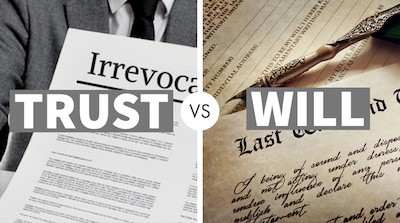The Difference Between a Will and a Trust – a Checklist

What is the difference between a will and a trust? It’s true that both a will and a trust can accomplish similar things. Both a trust and a will are legal documents which contain a set of instructions for what happens to your assets after your death. But there are substantial differences between them. The main difference is that for a trust to work, the property has to be transferred to the trust while you are alive. Unlike with a will, where the property can stay on your name and will only be transferred to the estate or to your beneficiaries after your death.
In New York, a will requires two witnesses but no notary. A trust requires a notary but no witnesses.
Whether to dispose of your property through a will or through a trust depends on your goals. Many people make wills because they are simpler, cheaper and faster and you don’t have to transfer any property during your lifetime.
However, there are also good reasons why a person would choose a trust over a will, such as:
Flexibility – a trust can hold assets even after your death, which allows flexibility. In trust as different from a will, there is no contest that the trust provides infinitely more options.
A trust allows you to disburse funds upon occurrence of an event. In a trust, the trustee can disburse fund upon your beneficiary reaching a certain age or life milestone – turning 25, getting married, getting out of rehab, getting out of debt, etc.
A trust allows you to have your second wife use the funds and have what’s left go to your children from the first marriage. A will does not allow that to happen. The only thing you can do with a will is either leave the property to the first wife or to the children, or some to her and some to the children. In a will, the property has to be disbursed right away in the probate process, which is different from a trust, which allows much greater flexibility.
Qualify for Medicaid – There are several types of trust that can help some individuals qualify for Medicaid, including home care and nursing home coverage. Learn more about Medicaid trusts.
Protection from creditors and lawsuits. A properly executed and funded irrevocable trust will shield the principal of the trust from creditors and lawsuits.
Avoid probate – Probate proceedings can become expensive and delayed. Property that you will transfer to a trust will not have to go through probate. This is an important thing that makes a big difference between a will and a trust.
Protection from your children’s spouses and creditors. You may not want any of your hard-earned assets to go to your child’s spouse, whether in divorce or as an inheritance. You do not want any of the assets you give to your child to go to your child’s creditors, whether as a result of a lawsuit or in bankruptcy.
Maintain privacy – Proceedings in probate court are public record. Any person or organization will be able to find out the extent and location of your assets. Not so with trusts.
Avoid multiple-state probate proceedings – If you have property in multiple states, you can avoid ancillary probate proceedings by transferring your property into a trust. Upon your death, the property will pass according to the trust and multi-state Surrogate’s Court proceedings will not be required.
Protection from irresponsible beneficiaries. A trust provides limits on how your beneficiaries can spend the assets. For example, you can specify amounts upon reaching a specified age. This is one of the ways in which there is a difference between a will and a trust, where the assets have to be distributed right away.
Avoid interruption of income and use of assets – A trust provides for the continuity of management of your assets, and avoids interruption of income and use of assets upon your death or disability. Without a trust, your estate or business may be subject to restrictions imposed by the probate court.
Provide planning for mental disability – A trust lets you select a trustee – someone you trust to manage your estate on your behalf in the event you become unable to do so yourself. Read more in Planning for Disability.
Save money on estate taxes – Trusts can help you legally save a substantial amount on estate taxes. Read How to Avoid Estate Taxes to learn more about the credit shelter trust the life insurance trust. A “QTIP” trust or a QDT trust for the benefit of your spouse can further your tax savings goals.
A Charitable Remainder Trust (CRT) or a Charitable Lead Trust (CLT) will help you maximize your tax advantage per charitable dollar. A Grantor Retained Annuity Trusts (GRAT), an Intentionally Defective Grantor Trusts (IDGT), or a Unitrust are advanced trusts that remove appreciation of your property from your estate. Read more in Advanced Estate Planning.
As you can see, there is a big difference between a will and a trust. You can call the Law Offices of Albert Goodwin at (212) 233-1233 and make an appointment to discuss your New York estate planning needs.













